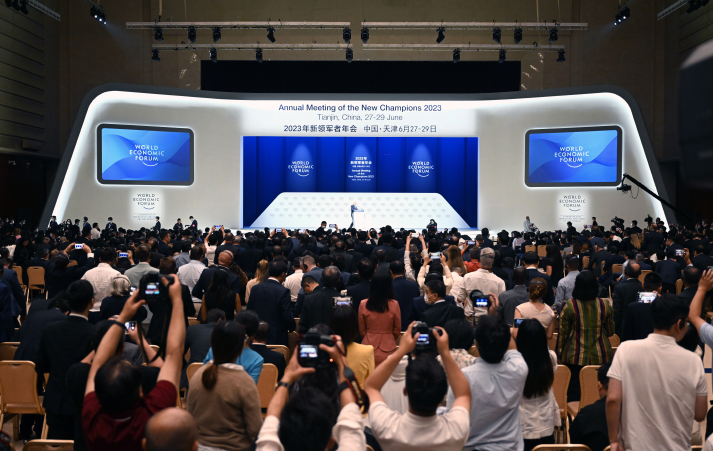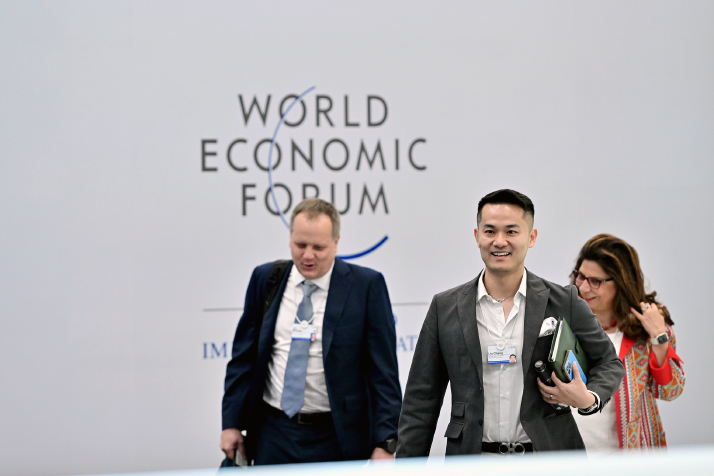| Business |
| Championing the global cause | |
|
|
 The opening ceremony of the World Economic Forum's 14th Annual Meeting of the New Champions, also referred to as the Summer Davos, in Tianjin Municipality on June 27 (XINHUA)
Beijing, capital of China, around 1 p.m. on June 23. The city recorded temperatures of 40 degrees Celsius for two consecutive days for the first time since the capital's weather records began in 1961, according to its meteorological center. A heatwave is still baking north China at the time of writing. In Europe, most parts of Spain have been weathering scorching temperatures since late June, with the mercury in some areas rising to 44 degrees Celsius. Unseasonal heat had already affected large parts of the Iberian Peninsula in March and April, a situation Spanish Environment Minister Teresa Ribera described as "terrifying." A protocol that bans some outdoor work during extreme heat conditions is currently in place in some areas of the country. Crossing the Atlantic Ocean from Southern Europe, more than 100 million Americans received poor air quality alerts on June 29, as drifting smoke from prolonged wildfires in Canada had spread out across New York, New Jersey, Pennsylvania, Washington, D.C. and parts of North Carolina, darkening the skies and putting public health at risk. Climate change, caused by humans burning fossil fuels and releasing greenhouse gases into the atmosphere, combined with this year's El Niño, a natural climate pattern caused by fluctuations in ocean surface temperatures, set a new world record for worldwide heat on July 4—17.18 degrees Celsius. This may not sound that hot to anyone sweating through soaring summer temperatures, but the figure is almost a full degree Celsius above the average between 1979 and 2000 and represents a new indicator that the Earth's climate is heating up faster than anticipated. At the World Economic Forum's (WEF) gathering in Tianjin Municipality, China, from June 27 to 29, an assembly also referred to as the Summer Davos, Prime Minister of Barbados Mia Mottley urged governments and private sector leaders to take immediate action on addressing climate change. "I think we are all agreed that first and foremost, the world is facing a climate crisis," Mottley said. "No country can escape the impact of climate change—unless you want to move to Mars."  A model of Tianjin Port's intelligent, zero-carbon terminals is on display at the Tianjin Meijiang Convention and Exhibition Center during the 14th Annual Meeting of the New Champions from June 27 to 29 (XINHUA)
Time for transformation But the climate change crisis isn't the only predicament shaking the world to its very core. The world is at a pivotal moment of transformation. Established business and industry models have not only been challenged by the years-long COVID-19 pandemic but are now being put to the test courtesy of a more competitive geopolitical and geoeconomic environment. How to navigate these developments and simultaneously accelerate progress on critical common goals, from energy transition to safeguarding nature and climate, is top of the agenda for decision-makers worldwide. To respond to this evolving landscape, the WEF returned to its Summer Davos tradition after a three-year suspension due to the COVID-19 pandemic, convening the 14th Annual Meeting of the New Champions in Tianjin. Themed Entrepreneurship: The Driving Force of the Global Economy, the meeting welcomed some 1,500 representatives from the governments, international organizations, business sectors and academia of more than 90 countries. Having gone through the twists and turns of economic globalization, all countries should cherish openness and cooperation more, Chinese Premier Li Qiang said in his opening address. Holding high the banner of peace, development and win-win cooperation, China is committed to building world peace, promoting global development and upholding the international order, Li stressed. In his speech at the opening ceremony, Klaus Schwab, founder and Executive Chairman of the WEF, called for global efforts to fight fragmentation and strive for dialogue, understanding and collaboration. "We stand for a future where nations have to work together for the collective wellbeing of humanity," he said.  Participants head into the main venue of the 14th Annual Meeting of the New Champions, also known as the Summer Davos, in Tianjin Municipality on June 27 (XINHUA)
Common interests With its deep integration into the world economy, China has developed itself by embracing globalization and has over the decades grown into a reliable force for globalization. Some Western politicians have promoted the idea of "de-risking" relations with China this year. This could involve reducing China's role in vital supply chains, as well as screening and even curbing investments in and from China. Many forum participants expressed that this concept is "irrational and absurd." Hungarian Minister of Foreign Affairs and Trade Peter Szijjarto said at a panel discussion that "de-risking would be a brutal act of suicide" committed by the European economy. "Unlike other European countries and politicians, we Hungarians look at China as a country that if you cooperate with it, it will bring you a lot of potential value," he told Beijing Review. "It's obvious that if European countries look at China as a rival, instead of a partner, they will lose China... If we cut the ties between China and Europe, this is going to be a knockout to the European economy." New Zealand Prime Minister Chris Hipkins echoed Szijjarto's opinions at the forum. "The New Zealand-China relationship is an incredibly important one for New Zealand," he said, adding that while China is already New Zealand's largest trading partner, the country hopes to further expand bilateral trade. As global headwinds persist, engaging with one another in the open exchange of viewpoints, ideas and experiences is more crucial than ever, Børge Brende, President of the WEF, said at the closing session, expressing his hope that the exchanges will inspire all stakeholders to take action toward shared ambition. Brende further predicted China's position in terms of global growth. "Even if the world economy is sluggish, with a 2.8-percent [projected] growth this year, China is expected to achieve 5.4 percent," he added. "China, with these numbers, contributes to 36 percent of global growth." The participating experts also paid more attention to the long-term nature of China's economic growth. Eswar Prasad, a professor of trade policy at Cornell University, the U.S., said even if China delivers modest growth, it is important to keep in mind that for the world economy, "it is not only important that China grows, but also how it grows." China's economy shows a clear momentum of rebound and improvement this year: GDP grew 4.5 percent in the first quarter year on year and is expected to expand faster in the second quarter than in the previous three-month period. "We are on track to hit the growth target of around 5 percent set for the whole year. We have full confidence and the ability to achieve steady economic growth on the track of high-quality development for a long time to come," Premier Li said. An important anchor For global enterprises, China is synonymous with confidence, opportunity and vitality. For BEIT, an American quantum computing software research and development company, China's opening-up efforts provide opportunities for future technological cooperation. Paulina Mazurek, CEO of BEIT, told Beijing Review that she sees great potential when it comes to cooperation. At the same time, several foreign hi-tech companies are eyeing the broad space China offers for expanding their business in new-energy cooperation. The WEF on June 28 launched a report titled Green Hydrogen in China: A Roadmap for Progress, proposing measures to develop China's market for green hydrogen, a key enabler for the country to deliver on its objectives of peaking carbon emissions before 2030 and achieving carbon neutrality before 2060. Enapter is a German company that has developed a patented anion exchange membrane electrolyser, or in other words, a standardized, stackable and flexible system to produce on-site hydrogen. Sebastian-Justus Schmidt, CEO of Enapter, told Beijing Review that he has seen how China is continuously upping the stakes in the field of green hydrogen. "We are here to find partners in different areas and we've already met a few potential ones," he said. A country that attaches great importance to manufacturing and emphasizes the need to accelerate the modernization of its industrial system, with the real economy as its key pillar, China also plays an important role in Asia's manufacturing resurgence in the post-pandemic era. Zhang Kunyu, CEO of Tianjin Troila Technology Development Co. Ltd., a supplier of virtualization and cloud infrastructure software, said with the development of digital technology, the manufacturing industry's efficiency will improve remarkably. Zhang added it will be very likely for China, or Asia at large, to take the lead in this transformation, "because we have already established a complete digital infrastructure in the consumer field, and at the same time we have factories integrating multiple technologies now," he said. New trends According to the WEF's Chief Economist Outlook: January 2023, a briefing built on policy development research as well as consultations and surveys with leading chief economists from both the public and private sectors, organized by the WEF's Center for the New Economy and Society, successfully navigating the unpredictable path ahead requires countries to cooperate and adapt to a changing environment. According to the briefing, achieving these goals entails "establishing and strengthening public-private and East-West dialogues, promoting stakeholder participation, moving entrepreneurship from idea to reality and effecting positive change on a broader scale." At the Summer Davos, the WEF also released the Top 10 Emerging Technologies of 2023 report, listing this year's most impactful emerging technologies, something that proved of great interest to attendees. The report featured groundbreaking technologies such as flexible batteries powering wearable medical devices, generative artificial intelligence (AI) capable of creating original content and sustainable aviation fuel. Among many current technologies, generative AI, a type of AI system capable of generating text, images or other media in response to prompts, particularly commanded the participants' attention. The recent introduction of AI-based language models, like ChatGPT, has already impacted life at school and in the workplace, but if used properly, these tools can enhance productivity and creative output. "The application of ChatGPT in the manufacturing industry has brought along fundamental changes. In the future, the world will be divided into changes with or without ChatGPT," Zhu Min, Vice Chairman of the China Center for International Economic Exchanges, said during a panel discussion on June 28. In the era of the digital economy, computing power is becoming the core support and driving force for the development of said economy. "Also, the digital economy is data-driven. It is not enough to just turn data into resources; we must also turn data into assets," Zhu told Beijing Review. Copyedited by Elsbeth van Paridon Comment to taozihui@cicgamericas.com |
|
||||||||||||||||||||||||||||||
|